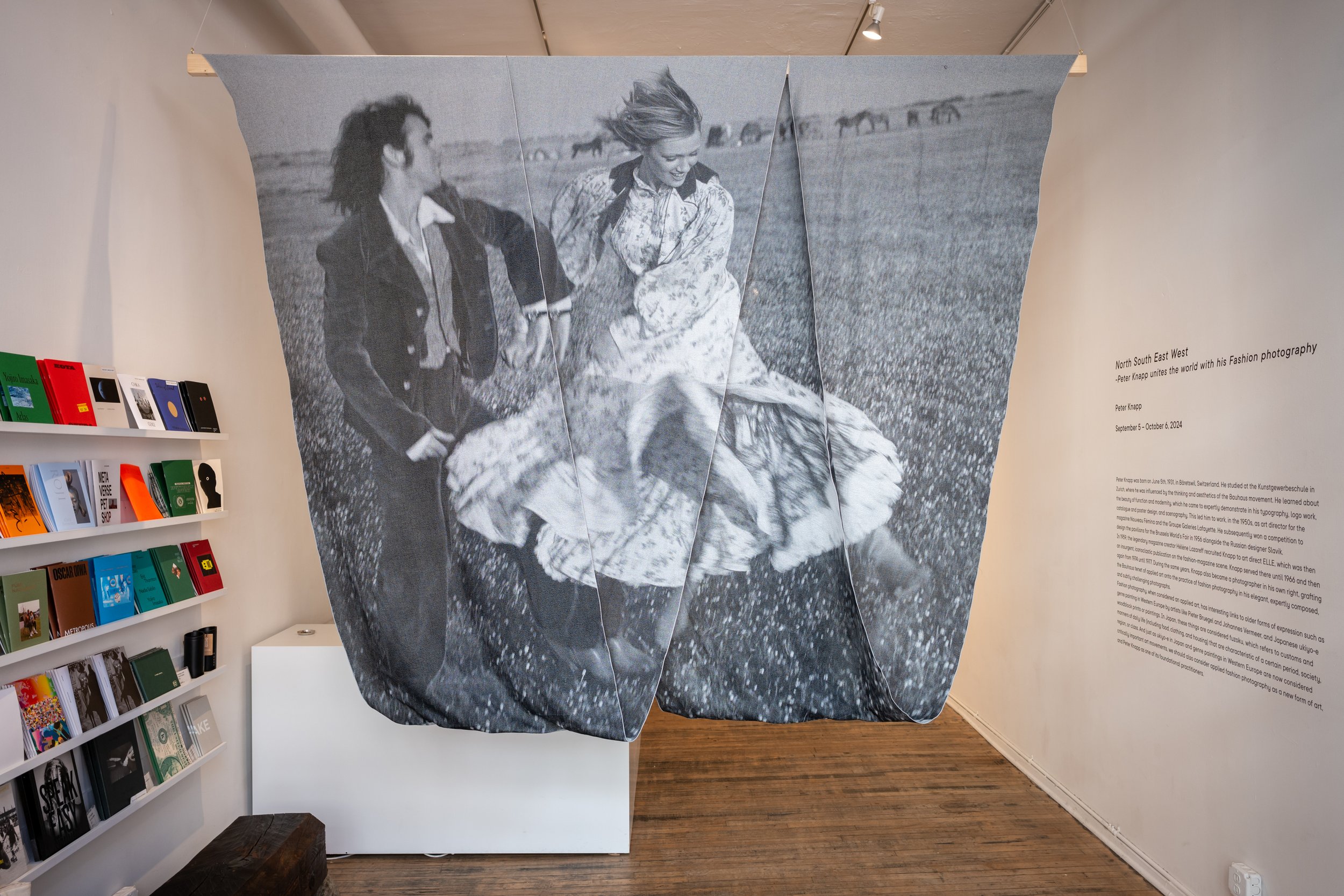HOME > EXHIBITIONS > PETER KNAPP
Peter Knapp
North South East West
Peter Knapp unites the world
with his Fashion photography
Curated by Joji Mita
September 5 – October 6, 2024
Opening Reception:
Thursday, September 5, 6-8pm
Click here for RSVP
Peter Knapp was born on June 5th, 1931, in Bäretswil, Switzerland. He studied at the Kunstgewerbeschule in Zurich, where he was influenced by the thinking and aesthetics of the Bauhaus movement. He learned about the beauty of function and modernity, which he came to expertly demonstrate in his typography, logo work, catalogue and poster design, and scenography. This led him to work, in the 1950s, as art director for the magazine Nouveau Fémina and the Groupe Galeries Lafayette. He subsequently won a competition to design the pavilions for the Brussels World’s Fair in 1956 alongside the Russian designer Slavik.
In 1959, the legendary magazine creator Hélène Lazareff recruited Knapp to art direct ELLE, which was then an insurgent, iconoclastic publication on the fashion-magazine scene. Knapp served there until 1966 and then again from 1974 until 1977. During the same years, Knapp also became a photographer in his own right, grafting the Bauhaus tenet of applied art onto the practice of fashion photography in his elegant, expertly composed, and subtly challenging photographs.
Fashion photography, when considered an applied art, has interesting links to older forms of expression such as genre painting in Western Europe by artists like Pieter Bruegel and Johannes Vermeer, and Japanese ukiyo-e woodblock prints or paintings. In Japan, these things are considered fuzoku, which refers to customs and manners of daily life (including food, clothing, and housing) that are characteristic of a certain period, society, region, or class. And just as ukiyo-e in Japan and genre paintings in Western Europe are now considered critically important art movements, we should also consider applied fashion photography as a new form of art, and Peter Knapp as one of its foundational practitioners.
Vogue, Nina Ricci, 1965
Paris (Moulin Rouge), France
Stern, 1978, Taroudant, Morocco
Stern, Kenzo, 1973, Andalusia, Spain
EXHIBITION VIEW












Peter Knapp
Biography
1931
Born in Bäretswil
1947–50
Student in the Graphic Arts Department of the Zurich School of Arts and Crafts, Course inspired by the Bauhaus
1948–50
Turns to painting and works in the studios of Monticelli and Otto Bachmann
Mar 1951
Arrives in Paris
1955
First photographic works
1955–59
Recruited by the director Jean Adnet and becomes art director at Galeries Lafayette.
1959
Travels to New York as assistant to Jean Tinguely
1959–66
Works as a photographer for ELLE before accepting the post of art director
1960
First fashion photographs
1965
Embarks on a 25-year collaboration as a fashion photographer with André Courrèges and Emanuel Ungaro
1966
Leaves ELLE when Hélène Lazareff departs and becomes a freelance photographer for Vogue, Stern and The Sunday Times
1966
Gives up painting to devote himself entirely to photography
1966
First medal from the Art Directors Club International; sixteen more will follow
1967
Joins Oliviero Toscani to establish Vogue in Italy
1970
Art Director of Zeit Magazin in Hamburg
1974–77
Returns to ELLE
1983–96
Professor of image design and photography at ESAG (École supérieure d’Art Graphique)
1988
Art director of Fortune
2006
Makes a documentary entitled Van Gogh, derniers jours à Auvers-sur-Oise Peter Knapp is a member of Rencontres de Lurs and AGI (Alliance Graphique Internationale) and lecturer at Sciences-Po
2021
Curates the exhibition The Giacometti: A Family of Creators, Fondation Maeght, Saint-Paul de Vence
Selected Exhibitions:
1958
Galerie Saint Germain, Paris, France
1966
Schweizerfahnen Galerie Palette, Zurich, Switzerland
1975
II Fait Beau Galerie Denise René, Paris, France
1978
Rencontres Internationales de la Photographie d’Arles Arles, France
1986
Peter Knapp Retrospective Paris Art Center, Paris, France
1988
Aeroflag Galerie Littmann, Basel, Switzerland
1988
Corpoflag Photokina, Cologne, Germany
1990
Grand maquillage–Art Expo, Tokyo, Japan
1993
Photos d‘elles. Temps de pose: 1950 – 1990, Centre de la Photographie, Geneva, Switzerland
2000
Le Siècle du Corps : Photographie 1900– 2000, Musée de l’Elysée, Lausanne, Switzerland
2001
Les Années Pop, Centre Pompidou, Paris, France
2008
Peter Knapp ou la passion des images, Maison européenne de la Photographie, Paris, France
2008
Peter Knapp, directeur artistique, Galerie Anatome, Paris, France
2009
The Last Waltz, Musée Nicéphore Niépce, Chalon-sur-Saône, France
2009
Sur le fil du film Théâtre de la photographie et de l’image, Nice, France
2014
Peter Knapp: Elles, 101 regards sur les femmes, Musée des Suisses dans le Monde, Geneva, Switzerland
2017
Peter Knapp, illustrateur – Dessins 1952–2016, Musée Tomi Ungerer, Strasbourg, France
2018
Dancing in the Street. Peter Knapp et la mode 1960–1970, Cité de la Mode et du Design, Paris, France
2000
L’Homme de paille Musée Nicéphore Niépce, Chalon-sur-Sâone, France
2022
Peter Knapp (solo exhibition) Fotostiftung, Winterthur, Switzerland
2023
Peter Knapp – Encounter Giacometti and Japan JAM, Luzern, Switzerland
Hideo Yamakuchi Textile Art
Hideo Yamakuchi Presents Textile Art in Tribute to Peter Knapp's North South East West Exhibition
Hideo Yamakuchi will showcase his textile work to honor Peter Knapp's exhibition, North South East West.
Peter Knapp is the legendary Swiss artistic director and influential photographer who unintentionally but indelibly inspired Japan's media landscape with his pioneering fashion photography. In 1959, Hélène Lazareff, founder and editor-in-chief of French Elle, entrusted Knapp with the artistic direction of the magazine. Knapp's innovative approach to applied fashion photography captivated the public and left a lasting impression in Japan, leading to the launch of an an / Elle JAPON in March 1970 by Heibon Shuppan, Co., Ltd. (now Magazine House, Ltd.), as a licensed extension of Elle in Paris.
Growing up in a renowned textile weaving family, Hideo Yamakuchi developed a passion for fashion and photography inspired by an an / Elle JAPON. The image chosen for his tapestry features the work of KENZO, aka designer Kenzo Takada, who, like Yamakuchi, is an alumnus of Bunka Fashion College. This intergenerational connection underlies their collaboration.
As Peter Knapp pioneered applied fashion photography, Yamakuchi invented photo-weaving, integrating personal "memories" into his textiles using unique weaving techniques. Traditionally, tapestries are limited to themes like religious paintings or picturesque landscapes. By merging this craft with digital technology, Yamakuchi enables weaving personal memories into his textiles.
Yamakuchi's artistic theme, "encounter daily memories through woven memory," is a tribute to Peter Knapp's remarkable contributions to applied fashion photography.
This piece, reflecting memories of 1980s fashion and photography, is crafted from 100% cotton jacquard weave using a "figured double weave" technique. In this method, black and white threads create a negative image on the back of the weave, contrasting the front. The fabric showcases Peter Knapp's photographs divided into parallelograms, with images woven together using positive and negative representations. The piece, 90 cm wide and 10 meters long, can be folded to connect images, conveying a single photograph.
The work's drape and slight misalignments lend a unique texture and presence, revealing overlapping images and the distinctiveness of woven fabric when viewed from different angles.
Biography of Hideo Yamakuchi
Born in 1962 in Yonezawa City, Yamagata Prefecture, Hideo Yamakuchi is the third generation in his family's weaving business. After graduating from Bunka Fashion College in 1988, he blended traditional weaving techniques with digital technology in 1990 and launched his artistic career in 1992.
Yamakuchi is an artist who portrays images through textiles, with "memory" as the central theme of his works. He likens the weaving process with warp and weft threads to the mechanism of memory in the brain, weaving his own photographs into textiles.
In 1997, his book "Weaving Memories" attracted the attention of Jack Lenor Larsen. President of the American Craft Museum (now the Museum of Art & Design) in the U.S., leading to a solo exhibition at the Larsen Foundation's Long House Foundation Gallery.
His works are part of the permanent collections of the Metropolitan Museum of Art, the Museum of Art & Design, and other museums. Yamakuchi has also produced numerous public works in Japan, including an official tapestry portrait of King Bhumibol Adulyadej of Thailand and a portrait of the Otocho of Sensoji Temple.
For more information, visit Hideo Yamakuchi's Gallery.








